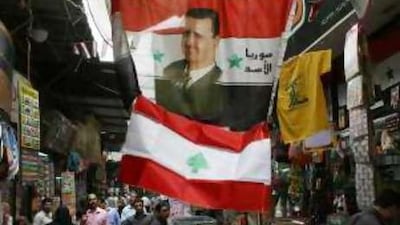BEIRUT // The Syrian government will open full diplomatic relations with Lebanon this year, according to a decree issued by the Syrian president yesterday. The Syrian Arab News Agency (Sana) reported that although no timetable for the opening of embassies had been established, Bashar Assad called for "the establishment of diplomatic relations between the Syrian Arab Republic and the Lebanese Republic, and the creation of a diplomatic mission at ambassador level in the Lebanese capital, Beirut".
The announcement could put to rest a controversy and tensions between the two neighbours that stretch back to the formation of both states in the 1940s after the collapse of French Mandate colonies. Before the 1940s, both western colonial powers and the Ottoman Empire considered Lebanon part of greater Syria, a stance that Syria maintained until yesterday to the detriment of normal diplomatic relations between the countries.
The United States and Europe have pushed Syria to recognise Lebanon's independence since a popular uprising against the 30-year Syrian occupation of Lebanon sparked by the assassination in a car bombing in 2005 of Rafiq Hariri, a former prime minister, forced the Syrian army to withdraw from Lebanon. But after years of diplomatic isolation over Lebanon and other regional issues, Syria was brought back into the fold of the international community. A French diplomatic initiative is widely credited with pressuring Mr Assad into recognising his tiny neighbour.
Lebanese political figures from both pro- and anti-Syrian camps said the recent visit by Nicolas Sarkozy, the French president, to Damascus was the catalyst to the move. A schedule for establishing mutual diplomatic missions and embassies could be set as soon as today, when Fawzi Salloukh, the Lebanese foreign minister, is expected to meet his Syrian counterpart in Damascus. A Syrian ministry official told the Associated Press: "There will be a Syrian Embassy and an ambassador in Lebanon soon and before the end of the year," the official said, speaking on condition of anonymity, in line with regulations.
Lebanon's fractious political community tends to split along support or opposition to Syrian influence in Lebanon, but even the most ardent anti-Syrian figures hailed the move as a key first step to normalising relations. Syria and Lebanon remain in bitter disputes over demarking the border between the two countries, over control of the disputed Shebaa farms area currently occupied by Israel, and over the fate of thousands of Lebanese who disappeared in Syrian custody.
Walid Jumblatt, a member of parliament and leader of the Progressive Socialist Party, who is loudly critical of Syria's role in Lebanon, was mildly optimistic yesterday but called for time to see if Syria would continue to respect Lebanese sovereignty, which he says it has failed to do in the past. "We are waiting for the Syrians to keep their promises and demarcate the borders with Lebanon, a step that will pave the way to restoring Shebaa farms to Lebanese sovereignty," Mr Jumblatt told the BBC. On the street, reactions were mixed according to one's views of Syria. Fawzi, 52, a Sunni from Beirut, said he saw the move as a victory by the new government to force Syria to admit Lebanon's independence. "Finally the Syrians recognised us as a country. Since Lebanon was formed, they never thought about us as an independent country," he said. "They always thought about us as a part of Syria. But it's a good move done by pressure from the president and the prime minister." But he added that in the May fighting between Syrian allies, led by Hizbollah, against the pro-western government, it was clear Syria had maintained its influence over factions in Lebanon. "What I think is Syria never stopped interfering inside our country, and they will never stop. We saw in May, during the clashes, Assad's pictures were back to the streets of Beirut once again, so I think they never left," he said. "They still have their loyal allies. Now I want to see how diplomatic they will be with us, and I'm hoping not to see their troops in our city again." Ali, 37, who lives in the southern suburbs and supports Hizbollah, argued that the move could isolate Syria from Lebanon at a time when both countries need to be closer to face Israel. "It's a good move between us and our sister neighbour Syria," he said. "They were always on our side never left us alone. Syria by doing such a move they are proving to [opponents] and the world their initiative of good will towards Lebanon. My opinion: I don't think we need to have embassies between us. It is going to make us feel like strangers towards each other. Every time I go to Syria I'm glad to see the people of Syria supporting us, supporting the resistance, and [Hizbollah leader] Sayid Hasan [Nasrallah] pictures are everywhere." mprothero@thenational.ae

